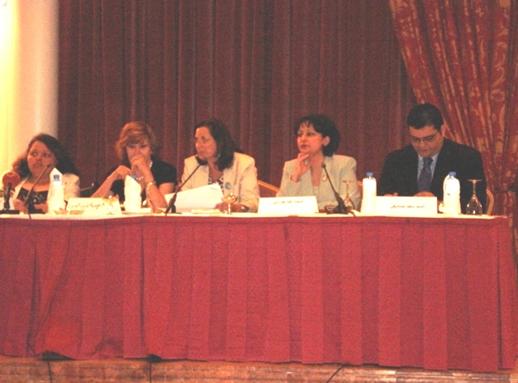LERC Participates in the National Conference on Electoral Law. Under the High Patronage of His Excellency The President of The Republic of Lebanon General Michel Sleiman, a National Conference entitled An Electoral Law Tailored for the Nation.
Wednesday, 11th June 2008, Phoenicia Hotel in Beirut.
After a long term political and institutional deadlock in Lebanon, a national conference on Electoral Law was co-organized by the National Commission on Electoral Law (NCEL) and the United Nations Development Programme (UNDP), in cooperation with the Civil Campaign for Electoral Reform (CCER). The conference aimed to highlight the importance of coming up with electoral reforms in order to protect pluralism and eliminate any kind of political exclusion. The conference was attended by diplomatic officials, local and international organizations, civil-society groups and associations, as well as by numerous Lebanese and Arab media correspondents.
The opening session stressed the importance of civil action for electoral reforms in Lebanon. On behalf of former Minister Fouad Boutros, NCEL’s member Ziad Baroud delivered his speech stressing the purpose behind the plan proposed by the Commission after nine months of hard debate in 2006. Martas Ruedas, the resident UNDP representative in Lebanon, considered electoral reforms as a crucial priority for enhancing democracy in Lebanon. In her statement, she focused on required key reforms proposed by the commission, such as lowering the voting age to 18 years, regulating campaign financing and media promotion and permitting the Lebanese diaspora an out-of-country vote. She stressed the role played by the UNDP concerning the technical and logistical support brought to the commission in order to enhance public awareness on the commission’s proposal. As a final note, Minister of Justice Charles Rizk addressed the audience on behalf of President Michel Sleiman. He pointed out that the commission has balanced between many plans for electoral districting and voting processes to allow the restoration of a multi-confessional political distribution in the country.
Following the opening notes, the conference started and was divided into three sessions that put emphasis on multiple aspects of the commission’s draft law.
The first session focused on the proposal to establish an independent electoral panel to observe the electoral process. Lecturers Mr. Ziad Baroud (NCEL Member), MP Ghassan Mokheiber, Dr. Ali Fayad (President of Hezbollah’s Consultation Center for Studies and Documentation), Dr. Khalil Gebara (Executive Director of the Lebanese Transparency Association), and Dr. Antoine Haddad (Member of the Democratic Renewal Movement) commented on the proposal from different points of view. They centered their presentations on the importance of regulating campaign spending, which is a crucial step toward the fair representation of all Lebanese. Organizing media coverage and automating the one-day electoral process were also priorities to strengthen the Lebanese democratic process.
The second session centered on burning issues concerning electoral reforms. Speakers were Dr. Arda Ekmekji (NCEL Member), Mr. Said Sanadeeki (LADE Executive Director), Ms. Sylvana Lakkis (President of Handicapped Association), Dr. Fahmiah Charafeddine (Vice-President of the Committee on Women’s Issues), and Ms. Guita Hourani (Associate Director of the Lebanese Emigration Research Center). In addition to discussion of the electoral district issue and other political considerations, a call was made to institute women-candidacy quotas, to lower the voting age to 18 years, and to apply the voting right for disabled persons and for Lebanese citizens living abroad.

During the second session, from left to right: Ms. Sylvana Lakkis, Dr. Fahmiah Charafeddine,
Dr. Arda Ekmekji, Ms. Guita Hourani, and Mr. Said Sanadeeki
In her presentation, Ms. Guita Hourani stressed the right of the Lebanese citizens living abroad to voting in absentia in the parliamentary elections of Lebanon. “Their forced migration and presence outside the country”, she said, “is not a reason to exclude them from exercising their constitutional right.” She also said that not allowing out-of-country voting for fear of politicizing the diaspora is unfounded, because the Lebanese emigrants are already as politicized as the Lebanese residents. She emphasized that although the constitution gives all the Lebanese the right to vote, consecutive Lebanese governments and parliaments have neglected to create the proper mechanism to allow the Lebanese who live abroad to execute their right. Ms. Hourani referred to many countries around the world that have had similar reservations whether in terms of the eligibility of the voters, the type of voting mechanisms, the issue of dual loyalty, voting secrecy, and others but have found solutions to the issues and have all created mechanisms that allows their non-resident citizens to practice absentee voting. She commanded the National Commission’s draft proposal which included absentee voting in an electoral law for the first time. Ms. Hourani stated that Lebanese expatriates could vote in person in Lebanese embassies and/or consulates abroad or by mail using a ballot, the latter being the least costly and the most accessible mechanism to opt for. Ms. Hourani concluded by saying that absentee voting would guarantee participation to all the Lebanese and would enhance democratic practices.
Speakers at the third session were Minister of Justice Charles Rizk and Members of Parliament, MP Farid El Khazen, MP Robert Ghanem, MP Samir Frangieh, and MP Ali Hassan Khalil. It focused on the electoral constituencies and the voting system in Lebanon. In their notes, MPs called attention to the positive impact that free and representative elections might have on democracy and public governance in Lebanon.